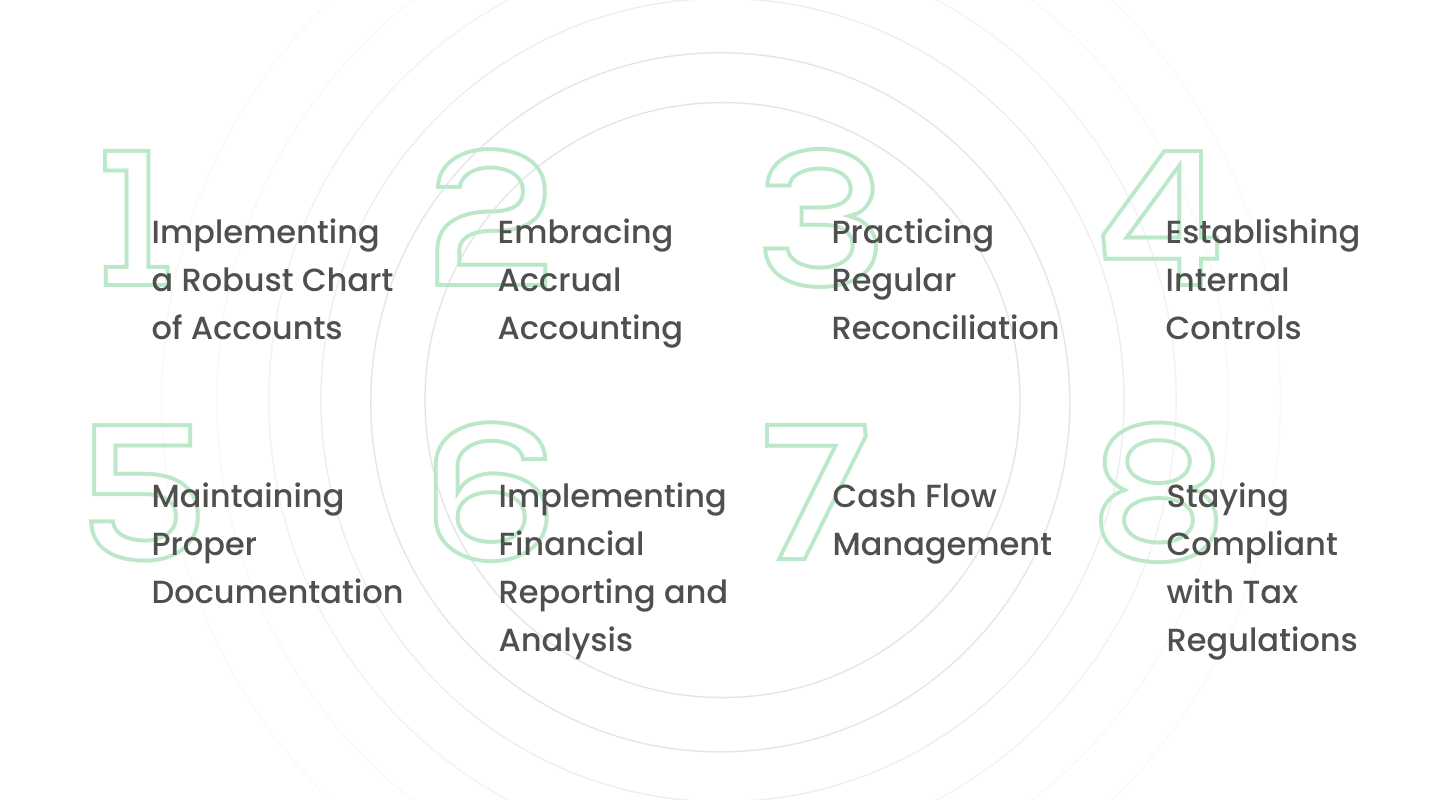In today’s fiercely competitive business landscape, maintaining accurate financial records and implementing effective accounting practices are fundamental to achieving financial excellence. By following established accounting best practices, businesses can ensure compliance, make informed decisions, and foster long-term growth. These practices form the cornerstone of sound financial management, enabling businesses to track income, expenses, and assets accurately. With robust financial reporting systems in place, organizations can gain valuable insights into their performance and identify areas for improvement. Adhering to generally accepted accounting principles (GAAP) promotes transparency and credibility in financial reporting. By establishing internal controls, businesses safeguard their assets and minimize risks. Embracing technology, such as accounting software and automation tools, streamlines processes and enhances efficiency. Regular financial audits provide an objective assessment of financial health and maintain accuracy. Seeking professional guidance from reliable service providers ensures expert insights and strategic financial management. By adopting these accounting best practices, businesses can navigate challenges, seize opportunities, and drive growth. In this blog, we will explore eight essential accounting practices that can empower businesses to streamline their financial operations, enhance decision-making processes, and pave the way for sustainable success.

Implementing a Robust Chart of Accounts
- Organizing Financial Transactions with Precision
- Tailoring the Chart of Accounts to Business Needs
A robust chart of accounts forms the foundation of sound financial management. By meticulously organizing financial transactions, businesses can accurately track income, expenses, assets, and liabilities. This organization facilitates efficient financial reporting, analysis, and decision-making processes. For instance, by assigning specific account codes to different types of expenses, businesses can easily identify cost centers and evaluate expenditure patterns. Tailoring the chart of accounts to the unique needs of the business ensures the inclusion of relevant categories and subcategories that align with industry standards and regulations.
Embracing Accrual Accounting
- Recognizing Revenue and Expenses
- Accurately Reflecting Financial Position
Embracing accrual accounting is a critical step towards gaining a comprehensive understanding of a company’s financial health. This accounting method recognizes revenue and expenses when they are earned or incurred, regardless of cash flow. By adhering to accrual accounting principles, businesses can present financial statements that accurately reflect the economic activities of the company. For example, let’s say a company provides services to a client in December but receives payment in January. Under accrual accounting, the revenue is recognized in December when the service is provided, rather than when the payment is received. This approach provides stakeholders with a more holistic view of the company’s financial position and performance, enabling better-informed decision making.
Practicing Regular Reconciliation
- Bank Reconciliation
- Balance Sheet Reconciliation
Regular reconciliation processes are indispensable for maintaining the accuracy and integrity of financial records. Bank reconciliation involves comparing internal records with bank statements to identify discrepancies and ensure that all transactions are accounted for correctly. Similarly, balance sheet reconciliation ensures that account balances align with supporting documentation, reducing errors, and instilling confidence in the financial statements presented. Regular reconciliation provides businesses with a clear understanding of their financial status, aiding decision-making and facilitating accurate reporting.
Establishing Internal Controls
- Segregation of Duties
- Authorization and Approval Processes
Establishing robust internal controls is crucial for safeguarding assets, ensuring compliance, and mitigating the risk of fraud. Segregation of duties involves dividing financial responsibilities among different individuals to create checks and balances. This practice prevents any single person from having complete control over financial transactions, reducing the potential for errors or fraudulent activities. For instance, one employee might be responsible for accounts payable, while another is responsible for approving payments. Additionally, implementing strong authorization and approval processes enhances accountability and minimizes the likelihood of unauthorized transactions, promoting transparency and trustworthiness in financial operations.
Maintaining Proper Documentation
- Invoice and Receipt Management
- Backup and Storage Systems
Maintaining proper documentation is vital for accurate record-keeping and efficient financial management. Effective management of invoices and receipts not only facilitate smooth bookkeeping but also aid in audit readiness and support financial decision-making. For example, keeping track of all invoices and receipts allows businesses to reconcile their financial records, verify expenses, and ensure timely payments to suppliers and vendors. By implementing reliable backup and storage systems, businesses can protect their financial information from loss, damage, or unauthorized access. Proper documentation practices ensure transparency, traceability, and accountability, allowing businesses to navigate financial processes effectively.
Implementing Financial Reporting and Analysis
- Timely and Accurate Financial Statements
- Key Performance Indicators (KPIs)
Implementing a robust financial reporting system enables businesses to generate timely and accurate financial statements. These statements provide a comprehensive overview of the company’s financial position, performance, and cash flow. By analyzing these statements, businesses can identify trends, strengths, and areas of improvement. Key performance indicators (KPIs) play a crucial role in financial analysis, as they provide measurable metrics that help evaluate the success of business strategies. For instance, KPIs can include profitability ratios, liquidity ratios, or efficiency ratios. Regularly monitoring KPIs helps assess financial health and identify areas for improvement, allowing businesses to make data-driven decisions.
Cash Flow Management
- Forecasting and Budgeting
- Managing Receivables and Payables
Effectively managing cash flow is vital for the financial stability and growth of any business. Forecasting and budgeting assist in projecting future cash inflows and outflows, allowing businesses to plan and allocate resources efficiently. By anticipating cash needs, businesses can make informed decisions regarding investments, expenses, and financing options. Managing receivables and payables is also crucial in optimizing cash flow. Implementing strategies such as offering discounts for early payments or negotiating extended payment terms with suppliers can help maintain a healthy cash flow position.
Staying Compliant with Tax Regulations
- Timely Filing and Payment
- Knowledge of Tax Laws and Updates
Maintaining compliance with tax regulations is essential for avoiding penalties and reputational damage. Timely filing and payment of taxes ensure adherence to regulatory requirements and foster good relationships with tax authorities. It is crucial for businesses to stay updated on tax laws and regulations through continuous education and engagement with tax professionals. This ensures that businesses are aware of any changes that may impact their tax obligations and can optimize tax planning strategies accordingly.
Conclusion
By implementing these eight accounting best practices, businesses can establish a solid foundation for financial excellence. From implementing a robust chart of accounts to emphasizing cash flow management and staying compliant with tax regulations, each practice contributes to accurate financial reporting, effective decision-making, and long-term growth. Remember, successful implementation requires commitment, ongoing evaluation, and a proactive approach to adapt to changing business environments. Embrace these best practices and unlock the potential for financial success in your business.
At Oak Street Technologies, we understand the critical role that accounting plays in the success of businesses. Our unwavering commitment to excellence drives us to provide the best-in-class accounting solutions that empower organizations to navigate the complexities of financial management and ensure that your business operates with utmost precision, efficiency, and accuracy. Our team of experienced professionals combines industry expertise with cutting-edge technology to deliver tailored solutions that streamline your financial operations, optimize decision-making processes, and pave the way for sustained growth.
Trust Oak Street Technologies to be your strategic partner in achieving financial excellence and unlocking the full potential of your business. Experience our nuanced and sophisticated approach to accounting services and witness the transformative impact it has on your organization’s success.




